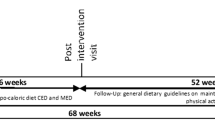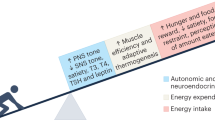Abstract
OBJECTIVE: Although the majority of weight loss attempts are unsuccessful, a small minority succeed in both weight loss and maintenance. The present study aimed to explore the correlates of this success.
METHOD: A group comparison design was used to examine differences between women who were classified as either weight loss maintainers (had been obese (body mass index, BMI=30+ kg/m2) and had lost weight to be considered non-obese (BMI<30 kg/m2) and maintained this weight loss for a minimum of 3 y; n=44), stable obese (maintained an obese weight (BMI=30+ kg/m2) for longer than 3 y; n=58), and weight loss regainers (been obese (BMI=30+ kg/m2), lost sufficient weight to be considered non-obese (BMI<30 kg/m2) and regained it (BMI=30+ kg/m2), n=40). In particular, the study examined differences in profile characteristics, historical factors, help-seeking behaviours and psychological factors.
RESULTS: The results showed that in terms of profile and historical factors, the weight loss maintainers had been lighter, were currently older and had dieted for longer than the other groups but were matched in terms of age, class and ethnic group. In terms of help-seeking behaviours, the weight loss maintainers reported having tried healthy eating more frequently but were comparable to the other subjects in terms of professionals contacted. Finally, for psychological factors the weight loss maintainers reported less endorsement for medical causes of obesity, greater endorsement for psychological consequences and indicated that they had been motivated to lose weight for psychological reasons.
CONCLUSIONS: Weight loss and maintenance is particularly correlated with a psychological model of obesity. This has implications for improving the effectiveness of interventions and the potential impact of current interest in medical approaches to obesity.
This is a preview of subscription content, access via your institution
Access options
Subscribe to this journal
Receive 12 print issues and online access
$259.00 per year
only $21.58 per issue
Buy this article
- Purchase on Springer Link
- Instant access to full article PDF
Prices may be subject to local taxes which are calculated during checkout
Similar content being viewed by others
References
Department of Health . Obesity: reversing the increasing problem of obesity in England. A report from the Nutrition and Physical Activity Task Forces HMSO: London 1995.
Bray GA . Effects of obesity on health and happiness.In Brownell KD, Foreyt JP (eds) Handbook of eating disorders: physiology, psychology and treatment of obesity, anorexia and bulimia. Basic Books New York 1986.
Stuart RB, Davis B . Slim chance in a fat world: behavioural control of obesity. Research Press: Champaign, IL 1972.
Brownell KD . The LEARN programme for weight control. American Health: Dallas, TX 1990.
Stunkard AJ . The management of obesity NY State J Med 1958 58: 79–87.
Wadden TA . Treatment of obesity by moderate and severe calorie restriction: results of clinical research trials Ann Intern Med 1993 119: 688–693.
Systematic review of interventions in the treatment and prevention of obesity. NHS Centre for Reviews and Dissemination, University of York 1997.
McGuire MT, Wing RR, Klem ML, Hill JO . Behavioral strategies of individuals who have maintained long term weight losses Obes Res 1999 7: 334–341.
Kayman S, Bruvold W, Stern JS . Maintenance and relapse after weight loss in women: behavioural aspects Am J Clin Nutr 1990 52: 800–807.
Colvin RH, Olson SB . A descriptive analysis of men and women who have lost significant weight and are highly successful at maintaining the loss Addictive Behav 1983 8: 287–295.
Hoiberg A, Berard S, Watten RH, Caine C . Correlates of weight loss in treatment and at follow up Int J Obes 1984 8: 457–465.
Kiernan M, King AC, Kraemer HC, Stefanick ML, Killen JD . Characteristics of successful and unsuccessful dieters: a application of signal detection methodology Ann Behav Med 1998 20: 1–6.
Klem ML, Wing RR, McGuire MT, Seagle HM, Hill JO . A descriptive study of individuals successful at long term maintenance of substantial weight loss Am J Clin Nutr 1997 66: 239–246.
Stuart RB, Guire K . Some correlates of the maintenance of weight lost through behaviour modification Int J Obes 1978 2: 225–235.
Neumark-Sztainer D, Kaufmann NA, Berry EM . Physical activity within community based weight control programme: programme evaluation and predictors of stress Public Health Rev 1995 23: 237–251.
Wadden TA, Foster GD, Wang J, Pierson RN, Yang MU, Moreland K, Stunkard AJ, VanItallie TB . Clinical correlates of short and long term weight loss Am J Clin Nutr 1992 56: 271S–274S.
Wong ML, Koh D, Lee MH, Fong YT . Two year follow up of a behavioural weight control programme for adolescents in Singapore: predictors of long term weight loss Ann Acad Med Singapore 1997 26: 147–153.
Klesges RC, Klesges L . Cigarette smoking as a dieting strategy in a University population Int J Eating Disord 1988 7: 413–419.
Ohlin A, Rossner S . Maternal body weight development after pregnancy Int J Obes 1990 14: 159–173.
Haus G, Hoerr SL, Mavis B, Robison J . Key modifiable factors in weight maintenance: fat intake, exercise and weight cycling J Am Diet Assoc 1994 94: 409–413.
French SA, Jeffrey RW . Current dieting, weight loss history and weight suppression: behavioural correlates of three dimensions of dieting Addict Behav 1997 22: 31–44.
Rodin J, Bray GA, Attkinson RL, Dahms WT, Greenwa FL, Hamilton K, Molitch M . Predictors of successful weight loss in an outpatient obesity clinic Int J Obes 1977 1: 79–87.
Williams GC, Grow VM, Freedman ZR, Ryan RM, Deci EL . Motivational predictors of weight loss and weight loss maintenance J Pers Soc Psychol 1996 70: 115–126.
Heijmans MJ . Coping and adaptive outcome in chronic fatigue syndrome: the importance of illness cognitions J Psychosom Res 1998 45: 39–51.
Sjostrom L, Rissanen A, Andersen T, Boldrin M, Golay A, Koppeschaar HPF, Krempf M . Ramdomised placebo controlled trial of orlistat for weight loss and prevention of weight regain in obese patients The Lancet 1998 352: 167–172.
Acknowledgements
The author gratefully acknowledges the help of Cheryl Pitt and Dr Elizabeth Evans with data collection.
Author information
Authors and Affiliations
Corresponding author
Rights and permissions
About this article
Cite this article
Ogden, J. The correlates of long-term weight loss: a group comparison study of obesity. Int J Obes 24, 1018–1025 (2000). https://doi.org/10.1038/sj.ijo.0801354
Received:
Revised:
Accepted:
Published:
Issue Date:
DOI: https://doi.org/10.1038/sj.ijo.0801354
Keywords
This article is cited by
-
Correlates of health-related quality of life, psychological well-being, and eating self-regulation after successful weight loss maintenance
Journal of Behavioral Medicine (2013)
-
Favorable modulation of benign breast tissue and serum risk biomarkers is associated with >10 % weight loss in postmenopausal women
Breast Cancer Research and Treatment (2013)
-
Portion control for the treatment of obesity in the primary care setting
BMC Research Notes (2011)
-
What Distinguishes Weight-Loss Maintainers from the Treatment-Seeking Obese? Analysis of Environmental, Behavioral, and Psychosocial Variables in Diverse Populations
Annals of Behavioral Medicine (2009)
-
Conservative treatment of obesity in an academic obesity unit. Long-term outcome and drop-out
Eating and Weight Disorders - Studies on Anorexia, Bulimia and Obesity (2006)



